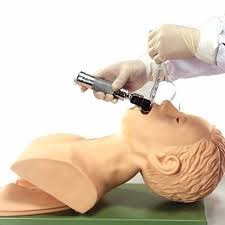When Nicole Hochleitner-Wain,Rural Community Medical Education (RCME) Liaison with RCCbc and Interior Health, and Dr. Geraldo Ndeve, General Practitioner and RCME Physician Lead for Lillooet, met to discuss local CME needs, airway management for COVID-19 patients jumped to the top of the list. With COVID-19 cases surging in rural parts of BC and little information and training available for rural physicians on airway management, the need was clear.
Under the RCME Community Program, Nicole began her search to find a doctor to develop and teach the course. Her efforts led to Dr. Ryan Hoskins, a CCFP (Emergency Medicine) certified physician who works part-time at Langley Memorial Emergency Room (ER) and spends a week almost every month doing rural ER medicine locums in British Columbia (BC) and the Northwest Territories.
 Dr. Hoskins got to work on designing the course, the first of its kind in BC. It distinguishes why and how airway management is different amid COVID-19 (an evolving science) and covers indications for intubation, preparation, medications, difficult airways and surgical airways. The course also provides a simulation, which allows providers to get hands-on experience with airway equipment and mannequins.
Dr. Hoskins got to work on designing the course, the first of its kind in BC. It distinguishes why and how airway management is different amid COVID-19 (an evolving science) and covers indications for intubation, preparation, medications, difficult airways and surgical airways. The course also provides a simulation, which allows providers to get hands-on experience with airway equipment and mannequins.
“We specifically designed this course for a rural setting,” explains Dr. Hoskins. “We took into account the resource limitations that exist and tried to directly address the most common questions and concerns that rural practitioners might have about intubation in the time of COVID-19.”
The rollout of the course hit a substantive snag when additional COVID-19 restrictions came into effect in BC. Originally, it was developed for in-person delivery in Lillooet, but had to be quickly changed to a Zoom-based format. Fortunately, Lillooet had the facilities to allow Dr. Hoskins to present virtually in their boardroom. And with the camera in the negative pressure room, he was able to lead the simulation.
“I was surprised how remarkably well it went,” says Dr. Hoskins. “Functionally, I think it was as good as or potentially better than being in person because it allowed other health providers who were off site to participate.”
Lillooet physicians who attended the course and practiced the procedure wearing goggles (which tend to feel unnatural) welcomed the opportunity to work through an intubation while experiencing the discomfort of wearing partial PPE.
According to Dr. Ndeve, the course provided an excellent review on airway management, done at a level for “occasional intubators”.
“One physician commented that, in some ways, the course made intubation easier than it is outside of COVID-19 because, normally, there are many options taught about how to approach intubation,” said Dr. Ndeve. “But with COVID, these options are reduced to just a few.”
Nicole and Dr. Hoskins hope to bring the timely Airway Management course to other BC communities in the coming months. If you are a doctor who would like to have it in your community, email .
For more information about the RCME Community Program, which provides funding for collective learning opportunities for rural physicians, visit the RCCbc website.


